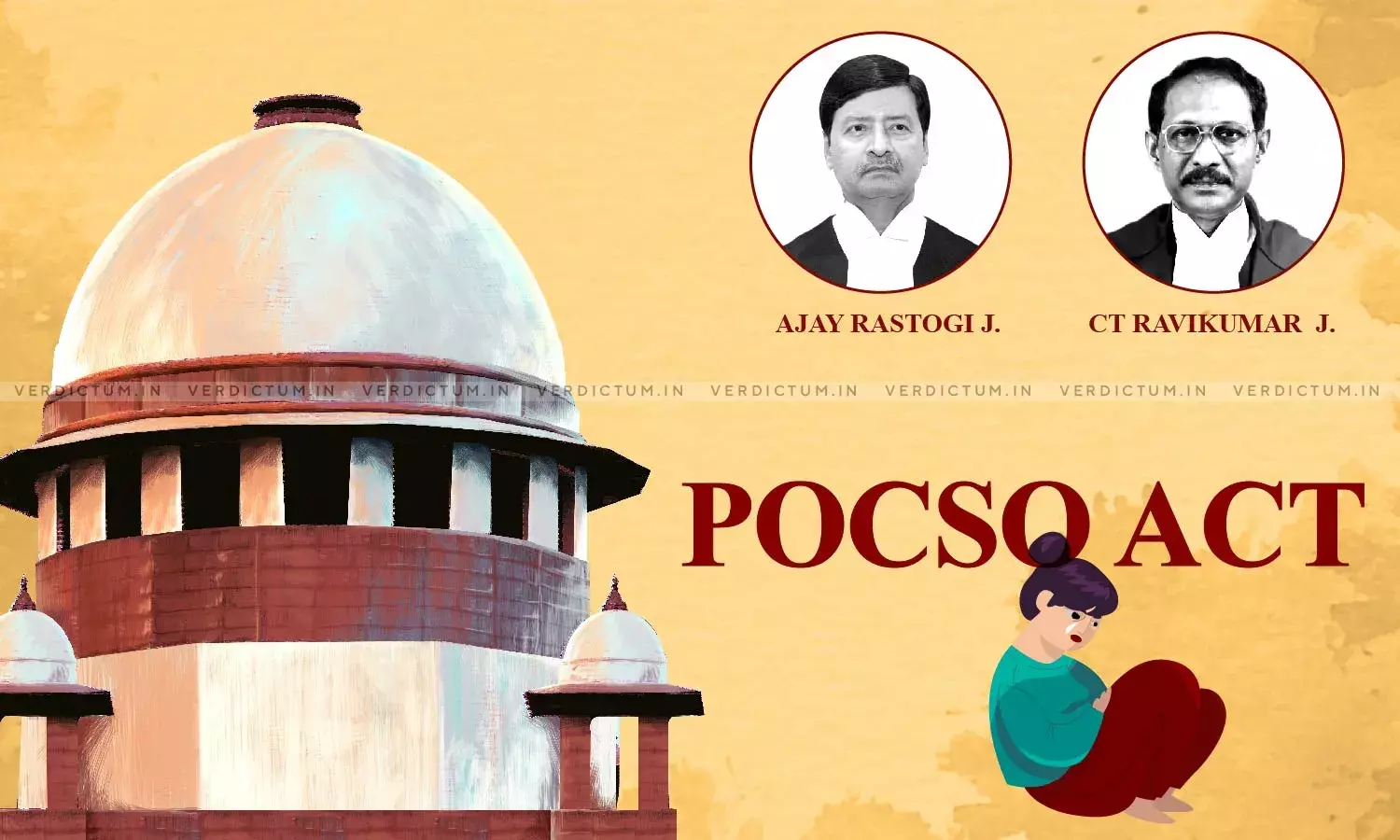POCSO Act: Non-Reporting Of Sexual Assault Against Minor Child Is Serious Crime, An Attempt To Shield Offenders- SC

The Supreme Court has observed that non-reporting of sexual assault against a minor child is a serious crime and more than that it is an attempt to shield the offenders of the crime.
The Bench of Justice Ajay Rastogi and Justice CT Ravikumar was hearing an appeal against the judgment of the Bombay High Court which had quashed and set aside the criminal proceedings against the Respondent, a medical practitioner who was accused of not reporting the offence of sexual assault under POCSO.
The Court observed, "...non-reporting of sexual assault against a minor child despite knowledge is a serious crime and more often than not, it is an attempt to shield the offenders of the crime of sexual assault."
In this case, an FIR came to be registered against the unidentified person(s) for committing sexual assault on minor tribal girls who were students. During the investigation, it was revealed that 17 minor girls were abused by the accused. The Respondent who was the medical practitioner appointed for the treatment of girls admitted to the Girls' hostel and the victim girls were taken to him.
The investigation revealed that the Respondent had knowledge about the incidents that occurred from the victims themselves as the girls had revealed in their statements recorded under Section 161 CrPC about their divulgation of sexual assault on them to the Respondent.
The Respondent who was under a legal obligation, in terms of the provisions under Section 19(1) of the POCSO Act upon getting the knowledge about committing of an offence under the POCSO Act, to provide such information either to the Special Juvenile Police Unit or the local police remained silent and did not provide such information to help the accused, is the gist of the allegation against him.
Apprehending arrest, the Respondent filed an anticipatory bail application before the Sessions Judge, which came to be rejected. The order was challenged before the High Court and the Court allowed the appeal and granted him protection from arrest. Thereafter, the Respondent filed an application under Section 482 CrPC for quashing of the FIR registered against him, which came to be allowed qua the Respondent.
Aggrieved, the State approached the Supreme Court.
Counsel Aaditya Aniruddha Pande appeared for the Appellant before the Apex Court.
The Court noted that the POCSO Act aims to ensure that the offenders under the Act are not spared and should be properly booked and thus observed-
"To achieve the avowed purpose, a legal obligation for reporting of offence under the POCSO Act is cast upon on a person to inform the relevant authorities specified thereunder when he/she has knowledge that an offence under the Act had been committed. Such obligation is also bestowed on person who has apprehension that an offence under this Act is likely to be committed."
The Court while referring to Section 21(1) of the POCSO Act also noted that failure to report the commission of an offence under Sub-Section 1 of Section 19 or Section 20 or failure to report such offence under Sub-Section 2 of Section 19 has been made punishable with imprisonment of either description which may extend to six months or with fine or with both.
The Bench went on to add that prompt and proper reporting of the commission of an offence under the POCSO Act is of utmost importance and its failure on coming to know about the commission of any offence thereunder would defeat the very purpose and object of the Act.
The Court also held, "Medical examination of the victim as also the accused would give many important clues in a case that falls under the POCSO Act. Section 27 (1) of the POCSO Act provides that medical examination of a child in respect of whom any offence has been committed under the said Act, shall, notwithstanding that a First Information Report or complaint has not been registered for the offence under the Act, be conducted in accordance with Section 164 A of the Cr.P.C., which provides the procedures for medical examination of the victim of rape."
The Court noted that prompt reporting of the commission of the offence under the Act if committed by the unknown person, would also enable the investigating agency to commence the investigation without wasting time and ultimately secure the arrest and medical examination of the culprit.
Thus, the Court held that the High Court arrived at the finding of absence of evidence to implicate the Respondent in the crime in question upon going through the statements of the victims and also the statement of the teacher of the victims, which recourse is absolutely impermissible.
The Court noted that in the light of the circumstances available, the High Court was not justified in bringing abrupt termination of the proceedings qua the Respondent.
Accordingly, the Court allowed the appeal and set aside the impugned judgment of the High Court.
Cause Title – The State of Maharashtra & Anr. v. Dr Maroti s/o Kashinath Pimpalkar

